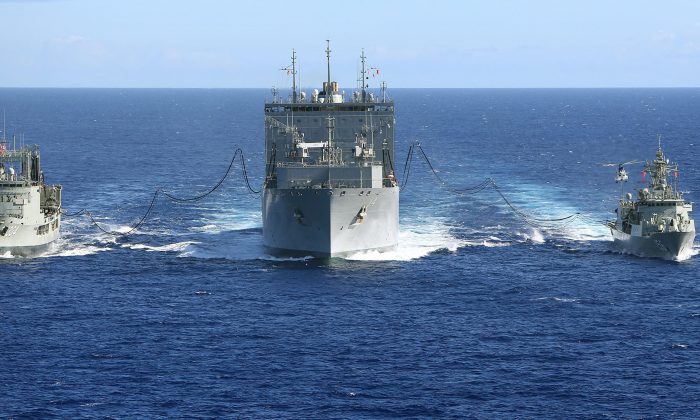McConnell: Senate Will Vote Next Week Confirm Barrett to Supreme Court
Japan’s military has agreed to create a framework for protecting Australian Defence Force assets as the two countries forge stronger bilateral ties amid rising tensions in the Indo-Pacific.
Japan’s Defence Minister Nobuo Kishi announced the transition in a joint statement with Australian Defence Minister Linda Reynolds on Oct. 19, who visited Tokyo for bilateral discussions with her counterpart.
“Australia is our “Special Strategic Partner” in the region and Japan Ministry of Defense, and Self-Defense Forces are going to deepen our bilateral defence cooperation and exchanges to uphold and reinforce the Free and Open Indo-Pacific,” said Kishi.
 Japan’s Self-Defense Force honour guards prepare for a welcoming ceremony of new Defence Minister Gen Nakatani in Tokyo on Dec. 25, 2014. (Kazuhiro Nogi/AFP/Getty Images)
Japan’s Self-Defense Force honour guards prepare for a welcoming ceremony of new Defence Minister Gen Nakatani in Tokyo on Dec. 25, 2014. (Kazuhiro Nogi/AFP/Getty Images)Reynolds concurred with Kishi saying: “Japan and Australia share a vision for a region that is open, that is inclusive, and one where the sovereignty, and the rights of all states, large and small, are respected.”
“Australia and Japan are working together to enhance our defence partnerships right across Southeast Asia and the Pacific. I am so proud to be standing next to Kishi-san at the beginning of our productive and important working relationship for both our nations,” said Reynolds.
Australia and Allies Pursue Pacific Arc of Democracy
Reynolds is currently shoring up Australia defence ties with the country’s strongest Indo-Pacific allies—Japan, Singapore, Brunei and the Philippines—to increase Australia’s bilateral defence arrangement against security challenges in the region.
Prior to departing for Japan on Oct. 16, Reynolds said that the Indo-Pacific is experiencing “the most consequential strategic realignment since World War II.”
“I will use my visit to deepen bilateral engagement with these important partners and friends, who share our vision of an open, inclusive and prosperous Indo-Pacific,” said Reynolds. “Our partnerships with regional countries have a long history, and we are focused on further strengthening these relationships through expanding defence diplomacy, cooperation and capacity building activities.”
The move by Japan and Austalia comes at a time when the Quad nations—Australia, the United States, Japan, and India—are seeking to send “a clear message” that they are strongly opposed to any coercive attempts by China to change the status quo in the Indo-Pacific, and especially in the South China Sea or the East China Sea.
 Chinese leader Xi Jinping (L) speaks after reviewing the Chinese People’s Liberation Army (PLA) Navy fleet in the South China Sea on April 12, 2018. (Li Gang/Xinhua via AP)
Chinese leader Xi Jinping (L) speaks after reviewing the Chinese People’s Liberation Army (PLA) Navy fleet in the South China Sea on April 12, 2018. (Li Gang/Xinhua via AP)The Quad, or the Quaderialteral Security Alliance, was established by former Japanese President Shinzo Abe and was designed as a way to form an arc of democracy around the Indo-Pacific region. It is viewed by the Chinese Communist Party as the Asian NATO.
Australia, Japan, India, and the United States are scheduled to participate in the Malabar Exercises in the Indian Ocean in November. This will be the first time since 2007 that Australia has joined the military exercises.
Announcing the news on Oct. 20, Reynolds said that Australia’s participation “will bolster the ability of India, Australia, Japan and the United States to work together to uphold peace and stability across our region.”
The United States, Australia, and Japan have rapidly increased their military presence in the Indo-Pacific in the past ten months, completing multiple military exercises in the Pacific since the start of the year all in an effort to secure the region from China.
Focus News: Japan and ‘Special Strategic Partner’ Australia Forge Stronger Alliance
